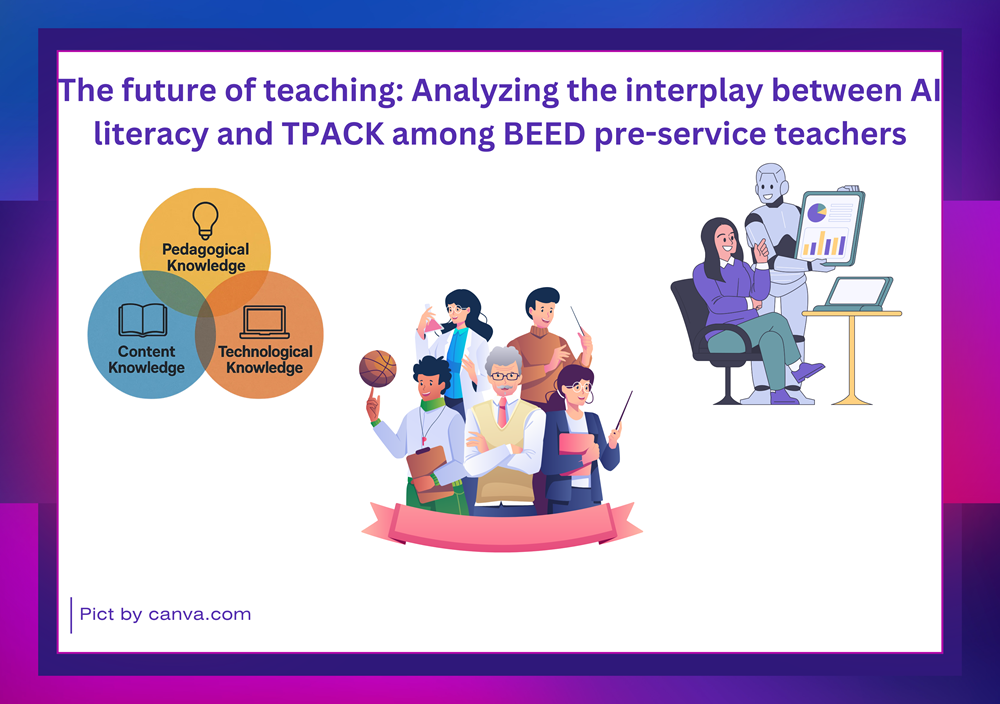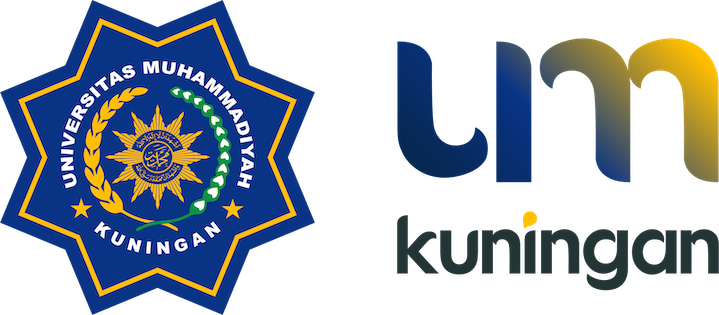The future of teaching: Analyzing the interplay between AI literacy and TPACK among BEED pre-service teachers

Downloads
Background: As artificial intelligence (AI) continues transforming the educational landscape, pre-service teachers must develop theoretical understanding and practical skills in AI integration.
Objectives: This study explored the relationship between AI literacy and TPACK among 139 BEED pre-service teachers.
Methods: Using descriptive statistics, Spearman's correlation, and multiple linear regression analysis, the study investigated how components of AI literacy relate to TPACK.
Results: Results revealed that the pre-service teachers demonstrated high levels of AI literacy, particularly in ethical awareness and intrinsic motivation. Pre-service teachers expressed strong interest in AI's educational potential and a commitment to its responsible use. While their foundational AI knowledge was high, many reported moderate self-efficacy and lacked confidence in executing AI-related tasks. Gaps were also noted in applying AI concepts to real-world teaching scenarios and designing AI-driven solutions. Furthermore, the results showed high TPACK proficiency, with strength in pedagogical and technological knowledge, though weaknesses were observed in content areas like mathematics and technical troubleshooting. A moderate positive correlation (Spearman's ρ = 0.48, p < 0.05) between AI literacy and TPACK indicates a meaningful association. Regression analysis revealed that AI literacy components explained 25.5% of the variance in TPACK. Cognitive learning emerged as the only significant predictor.
Conclusions: The findings underscore the need for teacher education programs to provide hands-on, cognitive-focused AI training. Hence, enhancing pre-service teachers' cognitive and practical skills is essential to thoroughly preparing them for AI-enhanced teaching environments' demands.
Aglibot, K. A., Tomines, E. M., Talaman, J., Soguilon, J., Bongolto, R., & Abayon, R. M. (2024). Usability of ChatGPT in the english essay writing proficiency of the BEED students. Journal of Science and Education (JSE), 4(2), 163-177. https://doi.org/10.56003/jse.v4i2.338
Annazar, M. F. Y., Firdaus, R., & Andra, D. (2023, May). Technology Pedagogical Content Knowledge (TPACK): An Analysis of Ability of Elementary School Teacher. In 4th International Conference on Progressive Education 2022 (ICOPE 2022) (pp. 669-684). Atlantis Press. https://doi.org/10.2991/978-2-38476-060-2_61
Aslan, S., Alanoğlu, M., & Karabatak, S. (2025). Enhancing 21st-century teaching competencies: The key role of digital literacy in connecting pre-service teachers’ TPACK. Information Development, 02666669251315841. https://doi.org/10.1177/02666669251315841
Ayanwale, M. A., Adelana, O. P., Molefi, R. R., Adeeko, O., & Ishola, A. M. (2024). Examining artificial intelligence literacy among pre-service teachers for future classrooms. Computers and education open, 6, 100179. https://doi.org/10.1016/j.caeo.2024.100179
Baran, E., & Uygun, E. (2016). Putting technological, pedagogical, and content knowledge (TPACK) in action: An integrated TPACK-design-based learning (DBL) approach. Australasian journal of educational technology, 32(2), 47-63. https://doi.org/10.14742/ajet.2551
Bautista, A., Estrada, C., Jaravata, A.M., Mangaser, L.M., Narag, F., Soquila, R., & Asuncion, R.J. (2024). Preservice Teachers' Readiness Towards Integrating AI-Based Tools in Education: A TPACK Approach. Educational Process: International Journal, 13(3), 40-68. https://doi.org/10.22521/edupij.2024.133.3
Cangül, H. A. (2022). Investigating the relationship between 21st-century skills and technological pedagogical content knowledge (TPACK) of in-service early childhood educators (Master's thesis, Middle East Technical University (Turkey)). https://hdl.handle.net/11511/99406
Carolus, A., Koch, M. J., Straka, S., Latoschik, M. E., & Wienrich, C. (2023). MAILS-Meta AI literacy scale: Development and testing of an AI literacy questionnaire based on well-founded competency models and psychological change-and meta-competencies. Computers in Human Behavior: Artificial Humans, 1(2), 100014. https://doi.org/10.48550/arXiv.2302.09319
Celik, I. (2023). Towards Intelligent-TPACK: An empirical study on teachers’ professional knowledge to ethically integrate artificial intelligence (AI)-based tools into education. Computers in human behavior, 138, 107468. https://doi.org/10.1016/j.chb.2022.107468
Chen, X., Zou, D., Xie, H., Cheng, G., & Liu, C. (2022). Two Decades of Artificial Intelligence in Education: Contributors, Collaborations, Research Topics, Challenges, and Future Directions. Educational Technology & Society, 25(1), 28–47. https://www.jstor.org/stable/48647028
Chenqi, L., Guoqing, L., & Xiangchun, H. (2023, December). Measuring Artificial Intelligence Literacy of Pre-service Teachers at a University in Northwest China. In 2023 Twelfth International Conference of Educational Innovation through Technology (EITT) (pp. 100-105). IEEE. https://doi.org/10.1109/EITT61659.2023.00027
Chiu, T. K., Xia, Q., Zhou, X., Chai, C. S., & Cheng, M. (2023). Systematic literature review on opportunities, challenges, and future research recommendations of artificial intelligence in education. Computers and Education: Artificial Intelligence, 4, 100118. https://doi.org/10.1016/j.caeai.2022.100118
Chou, C.-M., Shen, T.-C., Shen, T.-C., Shen, C.-H., & Liu, T.-L. (2023). Promoting pre-service teachers’ AI-supported application of self-efficacy. 2023 IEEE 3rd International Conference on Software Engineering and Artificial Intelligence (SEAI), 261–265. https://doi.org/10.1109/SEAI59139.2023.10217712
Diamah, A., Rahmawati, Y., Paristiowati, M., Fitriani, E., Irwanto, I., Dobson, S., & Sevilla, D. (2022, August). Evaluating the effectiveness of technological pedagogical content knowledge-based training program in enhancing pre-service teachers’ perceptions of technological pedagogical content knowledge. In Frontiers in Education (Vol. 7, p. 897447). Frontiers Media SA. https://doi.org/10.3389/feduc.2022.897447
Fazilla, S., Yus, A., & Muthmainnah, M. (2022). Digital literacy and TPACK’s impact on preservice elementary teachers’ ability to develop science learning tools. Profesi Pendidikan Dasar, 9(1), 71-80. http://dx.doi.org/10.23917/ppd.v7i1.9652
Ghamrawi, N., Shal, T., & Ghamrawi, N. A. (2024). School leadership 4.0: Are we ready?. In IoT, AI, and ICT for educational applications: Technologies to enable education for all (pp. 173-190). Cham: Springer Nature Switzerland. https://doi.org/10.1007/978-3-031-50139-5_9
Gonzalez, A. J., Hollister, J. R., DeMara, R. F., Leigh, J., Lanman, B., Lee, S. Y., & Wilder, B. (2017). AI in informal science education: Bringing turing back to life to perform the turing test. International Journal of Artificial Intelligence in Education, 27, 353–384. https://doi.org/10.1007/s40593-017-0144-1
Grosseck, G. (2023). Digital assessment: a survey of romanian higher education teachers’ practices and needs. Education Sciences, 14(1), 32. https://doi.org/10.3390/educsci14010032
Gu, X., & Ericson, B. J. (2025). AI Literacy in K-12 and Higher Education in the Wake of Generative AI: An Integrative Review. arXiv preprint arXiv:2503.00079. https://doi.org/10.48550/arXiv.2503.00079
Hava, K., & Babayiğit, Ö. (2025). Exploring the relationship between teachers’ competencies in AI-TPACK and digital proficiency. Education and information technologies, 30(3), 3491-3508. https://doi.org/10.1007/s10639-024-12939-x
Holden, O. L., Norris, M. E., & Kuhlmeier, V. A. (2021, July). Academic integrity in online assessment: A research review. In Frontiers in Education (Vol. 6, p. 639814). Frontiers Media SA. https://doi.org/10.1109/ICICCS48265.2020.9120905
Ji, Y., Oubibi, M., Chen, S., Yin, Y., & Zhou, Y. (2022). Pre-service teachers’ emotional experience: Characteristics, dynamics and sources amid the teaching practicum. Frontiers in Psychology, 13, 968513. https://doi.org/10.3389/fpsyg.2022.968513
Kamalov, F., Calonge, D. S., & Gurrib, I. (2023). New era of Artificial intelligence in Education: Towards a sustainable Multifaceted Revolution. Sustainability, 15(16), 12451. https://doi.org/10.3390/su151612451
Karina, B. (2024). Pre-service english teachers’ lived experience in using ai in teaching preparation. Edunesia Jurnal Ilmiah Pendidikan, 5(1), 550-568. https://doi.org/10.51276/edu.v5i1.767
Kim, S. W. (2024). Development of a TPACK Educational Program to Enhance Pre-service Teachers' Teaching Expertise in Artificial Intelligence Convergence Education. International Journal on Advanced Science, Engineering & Information Technology, 14(1), 1-9. https://doi.org/10.18517/ijaseit.14.1.19552
Koh, J. H., & Divaharan, H. (2011). Developing pre-service teachers' technology integration expertise through the TPACK-developing instructional model. Journal of Educational Computing Research, 44(1), 35-58. https://doi.org/10.2190/EC.44.1.c
Kong, S. C., Cheung, M. Y. W., & Tsang, O. (2024). Developing an artificial intelligence literacy framework: Evaluation of a literacy course for senior secondary students using a project-based learning approach. Computers and Education: Artificial Intelligence, 6, 100214. https://doi.org/10.1016/j.caeai.2024.100214
Mauraji, I., Senam, S., & Wiyarsi, A. (2021). Profile of pre-service chemistry teacher self-efficacy: a case on rate of reaction topic.. https://doi.org/10.2991/assehr.k.210326.038
Mikeladze, T., Meijer, P. C., & Verhoeff, R. P. (2024). A comprehensive exploration of artificial intelligence competence frameworks for educators: A critical review. European Journal of Education, 59(3), e12663. https://doi.org/10.1111/ejed.12663
Mishra, P., & Koehler, M. J. (2006). Technological Pedagogical Content Knowledge: a framework for teacher knowledge. Teachers College Record the Voice of Scholarship in Education, 108(6), 1017–1054. https://doi.org/10.1111/j.1467-9620.2006.00684.x
Ng, D. T. K., Leung, J. K. L., Su, J., Ng, R. C. W., & Chu, S. K. W. (2023). Teachers’ AI digital competencies and twenty-first century skills in the post-pandemic world. Educational Technology Research and Development, 71(1), 137–161. https://doi.org/10.1007/s11423-023-10203-6
Ng, D. T. K., Wu, W., Leung, J. K. L., & Chu, S. K. W. (2023, July). Artificial intelligence (AI) literacy questionnaire with confirmatory factor analysis. In 2023 IEEE International Conference on Advanced Learning Technologies (ICALT) (pp. 233-235). IEEE. https://doi.org/10.1109/ICALT58122.2023.00074
Ning, Y. (2024). Teachers’ ai-tpack: exploring the relationship between knowledge elements. Sustainability, 16(3), 978. https://doi.org/10.3390/su16030978
Pehlevan, İ., & Ünal, B. (2024). Investigating the Relationship between Digital Literacy and TPACK Levels of Pre-Service English Teachers. Dil Eğitimi Ve Araştırmaları Dergisi, 10(1), 87–111. https://doi.org/10.31464/jlere.1432879
Runge, I., Hebibi, F., & Lazarides, R. (2025). Acceptance of Pre-Service Teachers Towards Artificial Intelligence (AI): The Role of AI-Related Teacher Training Courses and AI-TPACK Within the Technology Acceptance Model. Education Sciences, 15(2), 167. https://doi.org/10.3390/educsci15020167
Rütti-Joy, O. (2023). Building ai literacy for sustainable teacher education. Zeitschrift Für Hochschulentwicklung, 18(4), 175-189. https://doi.org/10.21240/zfhe/18-04/10
Saharuddin, M. H., Nasir, M. K. M., & Mahmud, M. S. (2025). Exploring Teachers’ Technological Pedagogical Content Knowledge in Utilising Artificial Intelligence (AI) for Teaching. International Journal of Learning, Teaching and Educational Research, 24(1), 136-151. https://www.ijlter.org/index.php/ijlter/article/view/11509
Sarı, A. A., Bilici, S. C., Baran, E., & Özbay, U. (2016). Farklı branşlardaki öğretmenlerin teknolojik pedagojik alan bilgisi (TPAB) yeterlikleri ile bilgi ve iletişim teknolojilerine yönelik tutumları arasındaki ilişkinin incelenmesi. Eğitim Teknolojisi Kuram ve Uygulama, 6(1), 1-21. https://doi.org/10.17943/etku.11643
Schmidt, D. A., Baran, E., Thompson, A. D., Mishra, P., Koehler, M. J., & Shin, T. S. (2009). Technological Pedagogical Content Knowledge (TPACK). Journal of Research on Technology in Education, 42(2), 123–149. https://doi.org/10.1080/15391523.2009.10782544
Schubatzky, T., Burde, J. -P., Große-Heilmann, R., Lachner, A., Riese, J., & Weiler, D. (2025). From knowledge to intention: The role of TPACK and self-efficacy in technology integration. Computers and Education Open, 8, 100246. https://doi.org/10.1016/j.caeo.2025.100246
Shaikh, S., Yayilgan, S. Y., Klimova, B., & Pikhart, M. (2023). Assessing the usability of ChaTGPT for formal English language learning. European Journal of Investigation in Health Psychology and Education, 13(9), 1937–1960. https://doi.org/10.3390/ejihpe13090140
Shete, S. G., Koshti, P., & Pujari, V. I. (2024, April). The Impact of AI-Powered Personalization on Academic Performance in Students. In 2024 5th International Conference on Recent Trends in Computer Science and Technology (ICRTCST) (pp. 295-301). IEEE. https://doi.org/10.1109/ICRTCST61793.2024.10578480
Velander, J., Taiye, M., Otero, N., & Milrad, M. (2023). Artificial intelligence in k-12 education: eliciting and reflecting on swedish teachers' understanding of ai and its implications for teaching & learning. Education and Information Technologies, 29(4), 4085-4105. https://doi.org/10.1007/s10639-023-11990-4
Xie, S., Chen, X., Peng, S., & Zhang, S. (2023). Pre-service teachers' behavioral intention for AI-integrated instruction: A path analysis of the Theory of Motivation-Opportunity-Ability (MOA). In 2023 5th International Conference on Computer Science and Technologies in Education (CSTE) (pp. 1-5). IEEE. https://doi.org/10.1109/CSTE59648.2023.00057
Yue, M., Jong, M. S. Y., & Ng, D. T. K. (2024). Understanding K–12 teachers’ technological pedagogical content knowledge readiness and attitudes toward artificial intelligence education. Education and information technologies, 29, 19505–19536. https://doi.org/10.1007/s10639-024-12621-2
Zakaria, N. (2024). Shaping the future of education: conceptualizing pre-service teachers' perspectives on artificial intelligence (ai) integration. International Journal of Academic Research in Business and Social Sciences, 14(5), 643-653. https://doi.org/10.6007/ijarbss/v14-i5/21584
Zhao, L., Wu, X., & Luo, H. (2022). Developing ai literacy for primary and middle school teachers in china: based on a structural equation modeling analysis. Sustainability, 14(21), 14549. https://doi.org/10.3390/su142114549
Copyright (c) 2025 Karl Alvin Aglibot, Chelsea Lorraine Rito, Larence Villalon, Nelvin Gampal

This work is licensed under a Creative Commons Attribution-ShareAlike 4.0 International License.



